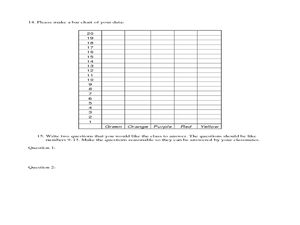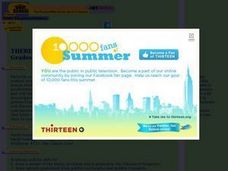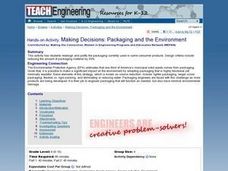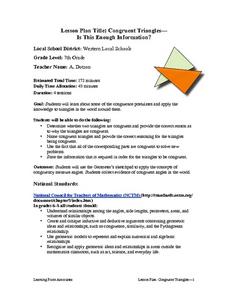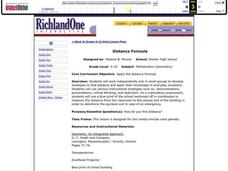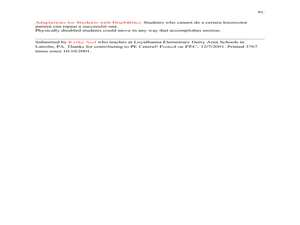Curated OER
Using Ratios to Taste the Rainbow
Students solve problems using ratios and proportion. In this algebra lesson plan, students analyze skittles and their different colors as they apply the properties of ratios and proportions to solve their problems.
Curated OER
The Fibonacci Sequence Through Art Lessons
It is easy to combine math and arts lessons to create motivating and interesting activities.
Curated OER
When Are We Ever Going To Use This?
Middle schoolers explore the relationships between fractions, decimals, and percents in a real-world context. They examine examples of percents from magazines and newspapers, and create posters that depict the use of percents in articles...
Curated OER
There's Gold in Them Thar Ratios
Students draw a model of the bunny problem which generates the Fibonacci Sequence, spirals generated from golden rectangles and golden triangles; identify the golden ratio in the human body, and find the Fibonacci numbers in nature.
Curated OER
Give Me the Money
Students view a money transaction on video and identify the steps involved in making a purchase and calculating change. They write out original money math problems and exchange them with classmates.
Curated OER
Measurement and Data Collecting using Image Processing
Students trace the route of the historical event and measure the distance over which the people involved journeyed. A data sheet be constructed outlining the location of events, and the speed with which the journey occurred.
Curated OER
Making Decisions: Packaging and the Environment
Students work in small groups to redesign the packaging of several common items. They attempt to reach the goal of 25% reduction in packaging materials currently used and explore the impact of various materials and designs in landfills...
Curated OER
Compare Human-made Objects with Natural Objects
Students examine and observe how many human-made objects get their basic design from things in nature. They listen to the book "Nature Got There First," compare/contrast hollow bones with drinking straws, bird beaks and tool pliers, and...
Curated OER
Congruent Trianges - Is This Enough Information?
Seventh graders determine whether two triangles are congruent and provide an explanation to why they are not. They apply concepts of measurement of angles and collect evidence of congruent angles in the world.
Curated OER
Weather Dot Com
Students examine the need for a standard unit of temperature and measure temperature with a thermometer. They discuss the details of a thermometer and the calibrations used, record temperature data for inside and outside, explore...
Curated OER
The Five Number Game
Students explain what it means to square numbers. They explain what it means to cube numbers. Students define prime numbers using their own language. They are introduced to the problem by playing one game as a class.
Curated OER
Made You Look
Students spend some time in the world of marketing and advertising by analyzing and creating slogans and campaigns geared toward adolescents. Students work with a partner to create their design and share with the class
Curated OER
Exploring Geometry in the Real World
Students find real-world examples of a variety of geometric shapes. They conduct research, record observations, and write descriptions. They create a classroom cityscape and highlight the information they gathered. They present an oral...
Curated OER
Falling Into Geometry Through Paper Art
Students explore geometric shapes. In this kindergarten geometry lesson plan, students create a fall quilt consisting of three different paper geometric quilt squares that when assembled form a scarecrow, a pumpkin, and a...
Curated OER
Distance Formula
Students determine the distance between two points. For this distance formula lesson, groups of students determine the distance between points in real life situations. They calculate the distance from one point in the...
Curated OER
Perimeter and Area of Rectangles
Students calculate the area and perimeter of rectangles. in this area worksheet, students determine the area and perimeter of their classroom. They complete a two-page worksheet by computing area and perimeter.
Curated OER
Math: Graphs and Their Symbols
Second graders examine different types of graphs and discover the meanings of the symbols used on them. After gathering data about themselves, their communities, and the world, they use that information to create graphs. Among the...
Curated OER
Real Math
Students explore careers that require math knowledge and solve real life math problems. As a class, they compare and contrast classroom math to real life math and explore the links between algebra, geometry and math skills used in...
Curated OER
Internet Measurement
Students become familiar with how to get information from the Internet. In this math and technology lesson plan, students measure objects on a measurement sheet found on a web site. They practice using a standard unit of measurement...
Alabama Learning Exchange
Simple Machines
Students watch a video and play a game. For this simple machines lesson, students watch a video on simple machines. They play an interactive game on the Edheads web site and share what they have learned. Throughout the day students...
Curated OER
Logarithms For Analog Circuits
In this electric circuit worksheet, students answer a series of 16 questions about logarithms and how they are used in understanding analog circuits. This worksheet is printable and the answers are viewed on-line.
Curated OER
Leaping!
Learners properly leap and measure their distance. In this leaping lesson plan, students practice leaping for accuracy and proper form. Learners estimate their leaps and measure with rulers. Students determine distance covered by the...
Curated OER
Teaching Fundamental Movement
Students perform fundamental movement activities for flexibility and motor skills. In this movement lesson plan, students perform physical activity for all grade levels.
Curated OER
All A-buzz About Math
Second graders participate in Math-Eze activities to comprehend word problems. In this word problem lesson, 2nd graders recognize why a hexagon is the best shape for a beehive. Students calculate how far bees must travel to find 2 lbs....
Other popular searches
- Everyday Mathematics Arrays
- Everyday Mathematics Review
- Everyday Mathematics Mixed
- Everyday Mathematics Dominos
- Everyday Mathematics Page 38


